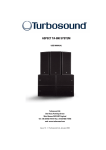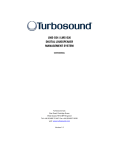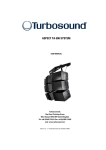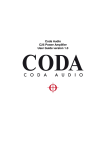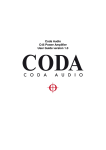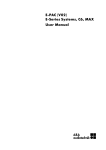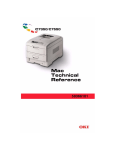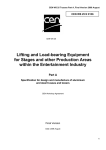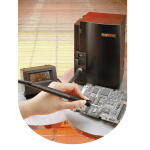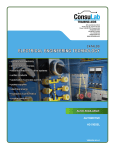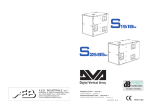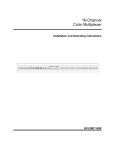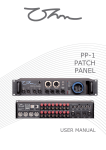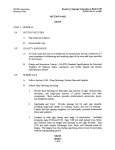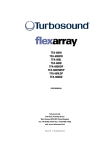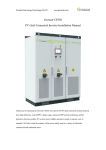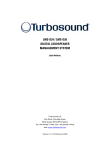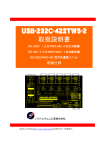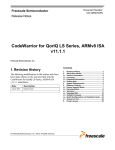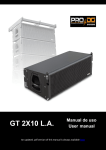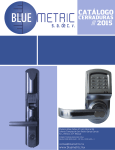Download TA-500
Transcript
ASPECT TA-500 SYSTEMS TA-500 TA-500DP TA-500t TA-500tDP TA-500H TA-500HDP TA-500HM USER MANUAL Turbosound Ltd. Star Road, Partridge Green West Sussex RH13 8RY United Kingdom Tel: +44 (0)1403 711447 Fax: +44 (0)1403 710155 web: www.turbosound.com Issue 1.1 © Turbosound Ltd. user manual TA-500 Contents EC Declaration of Conformity ...........................................................................................................................6 Introduction ........................................................................................................................................................7 Turbosound Aspect System Concepts .......................................................................................................7 The Aspect Polyhorn™ Concept..................................................................................................................8 The Loudspeaker Management System (LMS) Concept ........................................................................10 LMS-D2X Loudspeaker Management Systems .......................................................................................10 Network Capability .....................................................................................................................................10 Power Amplifiers.........................................................................................................................................11 Digital Controllers .......................................................................................................................................11 Self-powered Loudspeakers ......................................................................................................................11 Aspect Loudspeaker Components ............................................................................................................11 TA-500 Three-way Loudspeaker................................................................................................................13 TA-500DP Self-powered Three-way Loudspeaker...................................................................................13 TA-500t Touring Three-way Loudspeaker ................................................................................................13 TA-500tDP Self-powered Touring Three-way Loudspeaker ...................................................................13 TA-500H Horizontal Three-way Loudspeaker...........................................................................................14 TA-500HDP Self-powered Horizontal Three-way Loudspeaker..............................................................14 TA-500HM Two-way High/Mid Loudspeaker ...........................................................................................14 TSW-218 Subwoofer...................................................................................................................................14 B18 Subwoofer............................................................................................................................................15 B18DP Self-powered Subwoofer...............................................................................................................15 Transportation.............................................................................................................................................16 Flying and Stacking .........................................................................................................................................17 Flying and Stacking .........................................................................................................................................17 Overview......................................................................................................................................................17 Safety Notes on Rigging ............................................................................................................................18 Secondary Safeties .....................................................................................................................................19 Safety Inspections.......................................................................................................................................19 Sample Certificate of Load Test ................................................................................................................21 Flying Hardware...............................................................................................................................................22 Aspect TA-500 Flying Systems ..................................................................................................................22 Horizontal Coverage ...................................................................................................................................22 Vertical Coverage........................................................................................................................................22 A. TA-500t Touring Flying System .................................................................................................................23 TA-500 user manual Page 2 user manual TA-500 Flybar Settings ............................................................................................................................................23 Touring two-wide flybar.............................................................................................................................23 Table 1: Flying Matrix .................................................................................................................................25 FC-500T Flying Chains ................................................................................................................................25 TS-890 Tilting Straps ..................................................................................................................................27 Integral Flying Hardware............................................................................................................................27 Bolt ...............................................................................................................................................................28 Captive Biscuit.............................................................................................................................................28 Connecting Flying Chains to the Cabinet .................................................................................................29 Sliding the top chain profile into the slot .................................................................................................30 Connection of additional rows ..................................................................................................................31 Setting the angles between rows..............................................................................................................32 Attaching the biscuit...................................................................................................................................32 Attaching the Tilt Straps.............................................................................................................................33 Lifting the column .......................................................................................................................................34 B. TA-500 Install Flying System......................................................................................................................36 Rigging Instructions....................................................................................................................................37 Flying a single TA-500 cabinet using M10 eyebolts ................................................................................41 LMS series Loudspeaker Management Systems .........................................................................................42 Introduction .................................................................................................................................................42 Unpacking....................................................................................................................................................42 Mechanical Installation...............................................................................................................................42 LMS-D24 and D26 Loudspeaker management Systems .............................................................................43 TA-500 user manual Page 3 user manual TA-500 Features .......................................................................................................................................................43 Front Panel Functions.................................................................................................................................44 Rear Panel Functions ..................................................................................................................................46 Operating the LMS-D24 and D26...............................................................................................................47 Starting up ...................................................................................................................................................47 Selecting a Factory Preset..........................................................................................................................47 Creating a Crossover ..................................................................................................................................47 Navigation and Viewing Parameters ........................................................................................................48 Navigation ...................................................................................................................................................49 Presets..........................................................................................................................................................50 Preset Recall ................................................................................................................................................50 Preset Store .................................................................................................................................................51 DSP Processing Layout ..............................................................................................................................52 Input DSP block diagram............................................................................................................................52 Output DSP block diagram.........................................................................................................................52 Stereo / Mono Formats...............................................................................................................................52 DSP processing ...........................................................................................................................................53 Input Channels ............................................................................................................................................53 Parametric Equalisation .............................................................................................................................55 High and Low shelving filters ....................................................................................................................55 Parametric filters .........................................................................................................................................55 Output Channels .........................................................................................................................................56 Gain and Polarity.........................................................................................................................................56 Delay ............................................................................................................................................................56 High and Low Pass Filters ..........................................................................................................................57 Parametric Equalisation .............................................................................................................................58 Limiters ........................................................................................................................................................59 Routing.........................................................................................................................................................59 Utilities .........................................................................................................................................................60 Utility functions ...........................................................................................................................................60 T-25 and T-45 High Efficiency Audio Power Amplifiers ...............................................................................61 TA-500 user manual Page 4 user manual TA-500 General Features & Facilities .....................................................................................................................61 Front Panel Functions T-25 ........................................................................................................................62 Front Panel Functions T-45 ........................................................................................................................63 Mechanical Installation...............................................................................................................................64 Mains Power................................................................................................................................................64 Powering Up................................................................................................................................................64 Safety Earthing............................................................................................................................................64 Voltage Setting............................................................................................................................................65 Voltage Range .............................................................................................................................................65 Audio Connections & Controls ..................................................................................................................65 Polarity .........................................................................................................................................................66 Input Impedance .........................................................................................................................................66 Gain and Sensitivity Settings.....................................................................................................................66 Attenuation & Gain Setting........................................................................................................................67 Output Connections....................................................................................................................................67 Damping Factor...........................................................................................................................................67 Long Speaker Lines ....................................................................................................................................68 The Cooling System ...................................................................................................................................68 Appendix A: Technical Specifications ...........................................................................................................69 Appendix B: Spare Parts List ..........................................................................................................................71 Appendix C: Warranty .....................................................................................................................................72 TA-500 user manual Page 5 user manual TA-500 EC DECLARATION OF CONFORMITY Manufacturer Turbosound Ltd Star Road, Partridge Green, West Sussex, RH13 8RY Products TA-500DP TA-500tDP TA-500HDP T-25 Power Amplifier T-45 Power Amplifier LMS-D26 Controller LMS-D24 Controller Standards Safety EN60065:2003 Relevant Specifications used as basis for tests EN66103-1:1996 EN55103-2:1996 Category Professional apparatus for use in Commercial Light Industrial and controlled EMC environments. CE Marking All products are marked in accordance with the relevant statutory requirements. TA-500 user manual Page 6 user manual TA-500 INTRODUCTION Turbosound Aspect System Concepts The TA-500 system is a modular point source loudspeaker system designed to deliver extremely high fidelity audio. The system is easily scaleable medium scale ground-stacked and flown concert touring down to small clubs and events. The Aspect system concept centres around the exceptional directivity of the patented Polyhorn™ devices employed in the high frequency and high-mid frequency sections of the mid/high enclosure. In contrast to the majority of conventional horns, Polyhorns develop more consistent frequency response across all seats of an auditorium with minimal interference between adjacent enclosures. The patented Polyhorn™ devices exhibit a sharp cut-off at the edges of the dispersion pattern, making it possible to achieve seamless coverage of a venue with minimal destructive interference between elements, however many individual enclosures are deployed in the cluster. The Polyhorn™ devices generate phase-coherent and smoothlycurved wavefronts which match the array curvature, whose centre becomes the virtual point source. The TA-500 trapezoidal enclosure can be ground-stacked or flown in arrays. It can also be integrated with TA-880 or TA-890 systems as a front or side fill cabinet. TSW-218 dual 18” horn-loaded low frequency enclosures or B18 single 18” bandpass subwoofers provide ideal sub-bass support for the TA-500. TA-500 user manual Page 7 user manual TA-500 The Aspect Polyhorn™ Concept The patented Polyhorn™ design effectively solves the problem of the tendency for exponential horns to beam with increasing frequency. Dividing the multi-cellular horn into multiple tapered waveguides guarantees that the path length of each micro-horn is equal from the surface of the driver diaphragm to the horn mouth, and ensures that all frequencies from all parts of the diaphragm arrive at the horn mouth together. This provides the wavefront with uniformity of phase. A further benefit of the Polyhorn™ geometry is that the sound wave does not suffer from edge-diffraction effects which have a tendency to confuse the directionality of the sound source. Each cabinet in an array of Aspect loudspeakers contribute to the generation of a single, cohesive, and more or less continuous wavefront without noticeable comb-filtering effects. In addition, the Polyhorn™ design offers the possibility of locating the acoustic centre well behind the motor system and even the enclosure. The wavefront radii can now be arranged to coincide with the array curvature, forming a single virtual point source. Because of the Polyhorn™ design’s sharp cut-off, its array angle can in practice be taken as being the same as the dispersion angle. Fig 1. Conventional HF horns produce destructive interference TA-500 user manual Page 8 Fig 2. Poyhorn™ creates smoothly curved and phase-coherent wavefront user manual TA-500 • The TA-500 features approximately twice the horizontal and vertical dispersion as the narrower TA-880 and TA-890 products, making it more suitable for medium- and near-field applications in smaller rooms. • The Polyhorn™ displays a similarly sharp cut-off at the dispersion edges to the narrower TA-880 and TA-890 products, as illustrated below, and this makes it practical to cover a lot of small to medium venues with only two cabinets per side, giving approximately 100º of horizontal coverage per array. TA-880 narrow 25º horizontal coverage TA-500 wider 50º horizontal coverage TA-500 user manual Page 9 user manual TA-500 The Loudspeaker Management System (LMS) Concept Turbosound Loudspeaker Management Systems are more than just electronic crossovers. As well as steep slope active filters and high performance limiters, they provide full digital alignment of all components in the Aspect enclosures, to ensure a coherent acoustic output. They also incorporates a number of features which contribute to overall system reliability and ease of setting-up and use. All system parameters such as crossover frequencies, limiter settings and equalisation can be simply called up from a factory-set menu, making it possible to maintain consistent and repeatable system performance. Because the power amplifiers can be included as part of the Aspect system, the controllers are able to utilise output limiters which are precisely matched to the system requirements, being pre-set to prevent the amplifiers from clipping. Inputs and outputs are fully balanced, providing isolation between the controller and the amplifier inputs. These factors contribute to high reliability in the adverse circumstances often encountered under arduous touring conditions. In addition, LMS-D2X series controllers are equppied with built-in network capability, allowing maximum control and flexibility over the loudspeaker system’s performance and security. LMS-D2X Loudspeaker Management Systems Use of Turbosound loudspeaker management systems ensures accurate time-alignment of the system drive units and also provides a facility for users to select additional delay, either to compensate for physical displacement of ground-stacked bass enclosures relative to flown high packs, or to provide full range delay for correct image localisation or use in distributed systems. Network Capability Turbosound LMS series loudspeaker management systems and Turbosound self-powered loudspeaker systems are fully networkable, enabling control and monitoring of all networked devices via the BvNet protocol using Turbosound’s TurboDrive™ software, available as a free download from the Turbosound website www.turbosound.com For a detailed explanation of TA-500 networking capability please consult the TurboDrive™ User Guide, available in pdf as a download from our ftp site ftp://ftp.turbosound.com. TA-500 user manual Page 10 user manual TA-500 Power Amplifiers In addition to the Turbosound T-25 and T-45 model amplifiers recommended for use with Aspect systems, the following other power amplifier brands provide sufficient performance and mechanical compatibility to perform well with Aspect loudspeaker systems: • MC2 E series • Lab Gruppen FP series • Crest Pro series • QSC Powerlight II series Digital Controllers In addition to the Turbosound LMS-D24 and LMS-D26 loudspeaker management systems, the following digital crossovers have been tested and are recommended for use with Aspect systems: • BSS FDS366 • XTA 224. 226 and 428 • Dolby Lake Contour and Dolby Lake controller Self-powered Loudspeakers Aspect TA-500 series cabinets are additionally available with integrated networkable Class D amplifier modules, taking consistent performance and ease of use to a new level. Featuring lightweight high-power amplifiers using 96kHz DSP and operating at better than 90% efficiency, self-powered TA-500 products eliminate the need for separate amplifier racks and controllers, as well as the attendant cabling. Powered loudspeakers can be controlled and monitored over a network with a PC running the TurboDrive™ software. Aspect Loudspeaker Components All the drive units have been designed in-house specifically for the Aspect system and are manufactured exclusively for Turbosound. This means that they are expressly suited to their intended purpose, and make use of innovative features to ensure premium performance. TA-500 user manual Page 11 user manual TA-500 Neodymium magnets are used throughout all drive units. This results in higher efficiency, less power compression and reduced overall weight. Low-mid frequency drivers are designed to be rear-facing in the enclosure, enabling the heatsink / phase plug to be placed in the air flow to aid cooling. TA-500 user manual Page 12 user manual TA-500 TA-500 Three-way Loudspeaker The TA-500 trapezoidal enclosure contains a Turboloaded neodymium 15" LF driver, a custom 10” MF driver on a Polyhorn™ device, and a custom HF driver on a Polyhorn™ device, covering a frequency range from 60Hz up to 18kHz (with DSP). The two Polyhorn™ devices are designed to generate an exceptionally smooth and accurately defined wavefront across a 50º horizontal by 25º vertical dispersion pattern, and over the entire mid and high frequency bands. It is configured as a switchable tri-amped or bi-amped (with passive high end) product. The TA-500 is equipped for flying in fixed installations with an external flying system. TA-500DP Self-powered Three-way Loudspeaker The TA-500DP is a networkable, digitally self-powered version of the TA-500, and contains a Turbo-loaded neodymium 15" LF driver, a custom 10” MF driver on a Polyhorn™ device, and a custom HF driver on a Polyhorn™ device, covering a frequency range from 60Hz up to 18kHz. It includes an integrated 2-channel Class D power amplifier and control electronics module with built-in network capability. TA-500t Touring Three-way Loudspeaker The trapezoidal TA-500t is fully equipped for flown touring applications with an integrated rigging system designed for quick and easy flying with the minimum of external parts. The rigging system allows speaker clusters up to a maximum of nine enclosures to be assembled to suit a wide range of venues and audience spaces. It contains a Turboloaded neodymium 15" LF driver, a custom 10” MF driver on a Polyhorn™ device, and a custom HF driver on a Polyhorn™ device TA-500tDP Self-powered Touring Three-way Loudspeaker A self-powered version of the TA-500t with integrated TA-500 user manual Page 13 user manual TA-500 rigging system and integrated Class D amplifier module. TA-500H Horizontal Three-way Loudspeaker The TA-500H is a horizontally-orientated version of the TA-500 with the mid/high section rotated through 90° in order to maintain a 50° horizontal by 25° vertical dispersion pattern housed in a rectangular enclosure. TA-500HDP Self-powered Horizontal Three-way Loudspeaker A self-powered version of the TA-500H horizontal enclure with integrated Class D amplifier module. TA-500HM Two-way High/Mid Loudspeaker A high/mid cabinet used for downfill and infill applications. Consists of a custom 10” MF driver on a Polyhorn™ device, and a custom HF driver on a Polyhorn™ device in a trapezoidal enclosure. TSW-218 Subwoofer The horn-loaded TSW-218 is designed to cover the sub and low frequency ranges from 25Hz to 160Hz, and can be used as part of a 5way Aspect system in order to reinforce subbass frequencies. It utilises two custom designed neodymium 18” drivers loaded with TurboBass™ devices. The proprietary loading technique and horn flare design produces significant mutual coupling between adjacent enclosures, resulting in sensitivity gains of up to 110dB with eight units coupled. TA-500 user manual Page 14 user manual TA-500 B18 Subwoofer The B18 is a compact bandpass subwoofer designed to be used in a variety of installed sound system applications as well as portable sub-bass support for Aspect TA-500 enclosures. It consists of a high-excursion, 4” voice-coil, 18” LF driver in a bandpass birch plywood enclosure of modest dimensions. Speakon NL4 connectors are provided on the rear panel with special cable access bays that allow cabinets to be positioned against a wall when interconnected. B18DP Self-powered Subwoofer A self-powered version of the B18 subwoofer with integrated Class D amplifier module. TA-500 user manual Page 15 user manual TA-500 Transportation An optional WB-500 wheelboard is available which clips on to the front of the cabinet, allowing single units to be conveniently transported. These are designed to be stackable, so that when not in use they can be neatly stored without taking up unecessary floor space. TA-500 user manual Page 16 user manual TA-500 FLYING AND STACKING Overview The Aspect system flying hardware is specifically designed to take advantage of its precise horizontal directivity characteristics, as well as to allow a wide range of adjustment of the vertical angles between adjacent enclosures, and the overall vertical inclination of each column of enclosures. This means that arrays can easily be optimised to suit the coverage requirements of any situation. Sound radiating from adjacent cabinets will successfully blend over a range of included angles, creating a coherent point-source image, and this results in the ability to tailor both the overall coverage and the SPL at a given distance. The concept of arraying a point-source loudspeaker system is to create part of the surface of a sphere. A small part of a large sphere will form a high-directivity (long-throw) system with a high SPL at a distance, whereas a large part of a small sphere will be of lower directivity producing less SPL at a distance, but having a wider angle of coverage. This approach leads to the creation of a virtual point source of sound behind the array. There are some simple rules to follow to help achieve this goal: • Obtain a smooth even curve in the horizontal plane. • Use a similar amount of tilt on each column. • Ensure that the bottom corners of each column are in line with each other. TA-500 user manual Page 17 user manual TA-500 Safety Notes on Rigging The Turbosound Aspect rigging system has been designed and constructed to a high standard of safety, and tested to the most demanding of specifications. In order to ensure the highest safety standards, the information following on the assembly and safe use of rigging accessories must be carefully understood and followed. Only use Turbosound recommended rigging accessories, which are specifically designed for their intended purpose. Do not use Turbosound rigging with other types or brands of loudspeakers. This practice may compromise safety standards and Turbosound will not be responsible for damage or injury so caused. Do not modify the rigging accessories, or use them in a way other than that described in this user manual. Rigging components supplied as part of a complete assembly are noninterchangeable and must not be exchanged with the component parts of any other assembly. The component parts of a Turbosound rigging accessory must only be assembled using the fasteners and methods of assembly recommended in this manual. The use of fasteners and methods of assembly not specified or approved by Turbosound may result in an unsafe rigging assembly. Welding, or any other means of permanently fixing rigging components to each other or to cabinet fixing points is not allowed. Rigging assemblies must only be assembled using the appropriate parts and fixings as specified in this manual using the specific mounting instructions. Rigging components or assemblies must only be fixed to Turbosound loudspeaker cabinets using the cabinet fixing points, assembly methods and fasteners specified in this manual and the specific mounting instructions. Walls, floors or ceilings must be capable of safely and securely supporting the actual load. The rigging accessory used must be safely and securely fixed both to the loudspeaker and to the wall, floor or ceiling. When mounting rigging components on walls, floors or ceilings ensure that all fixings and fasteners used are of an appropriate size and load rating. Wall and ceiling claddings and the construction and composition of walls and ceilings all need to be taken into account when determining whether a particular fixing arrangement can be safely employed for a particular load. Cavity plugs or other specialist fixings, if required, must be of an appropriate type, fitted and used in accordance with the maker’s instructions. Use only the rigging accessory fixing holes indicated in this manual and the specific mounting instructions to fix Turbosound rigging accessories to walls, floors or ceilings. Where specified, the recommended maximum torque settings for screw fasteners must be strictly complied with. TA-500 user manual Page 18 user manual TA-500 Secondary Safeties All loudspeakers flown in theatres, studios or other places of work and entertainment must, in addition to the principle load bearing means of suspension, be provided with an independent, properly rated and securely attached secondary safety. Only steel wire ropes or steel chains of an approved construction and load rating may be used as secondary safeties. Plastic covered steel wire ropes are not permitted for use as secondary safeties. Safety Inspections Carefully inspect rigging systems components and cabinets for defects or signs of damage before proceeding to assemble a flown array. If any parts are damaged or suspect, DO NOT USE THEM. Regular, more rigorous test and inspection of rigging components must also be carried out. Safety legislation and test and inspection requirements will vary from country to country. In most cases, annual independent test and inspection by a suitably approved and qualified inspector will be required. Users must ensure compliance with all applicable safety requirements. Turbosound recommends regular safety inspections and further recommends that a logbook be kept detailing the test and inspection history of each Turbosound rigging accessory. Turbosound has adopted the following load safety factors: • 12 x load safety factor: Chains, ropes, shackles, eyebolts, straps and hooks. • 5 x load safety factor: Accessories generally employed in fixed, permanent installations. Always wear protective headwear, footwear and eye protection in accordance with local regulations. Anyone involved in flying ANY sound system, especially in a touring capacity, should take note of the following advice: The rigging of a flown sound system may be dangerous unless undertaken by qualified personnel with the required experience and certification to perform the necessary tasks. Fixing of hanging points in a roof should always be carried out by a professional rigger and in accordance with the local rules of the venue. The house rigger and/or building manager must always be consulted. You should observe particularly the following points: TA-500 user manual Page 19 user manual TA-500 When initially ratcheting a column of speakers it is good to bear in mind the expected angle of inclination so as to avoid ending up with too much of the strap left on the ratchet. This is important because the ratchet can only take three complete turns before it releases itself. WARNING: If a tilt strap is released suddenly, the column of enclosures may tend to swing violently forwards and care must be taken to avoid danger to persons in the vicinity. It is essential to check that nobody is standing immediately in front of the column, and to give a suitable warning, before the strap is released. Ideally, two persons should support the column from the side whilst the strap is released, or alternatively the bottom row may be returned to the ground before release. In any event it is essential that all personnel in the vicinity are aware that the system is about to move and that they must keep clear. Aspect Flying System components have been individually tested in accordance with the following regulations: • The Health and Safety at Work Act 1974 • The Supply of Machinery (Safety) Regulations 1992 • The Lifting Operations and Lifting Equipment Regulations 1998 Each component is covered by a Record of Load Test Certificate, which may be obtained on request from Turbosound, quoting the indentifying number(s) from the flying equipment. A copy of a sample certificate is reproduced overleaf. TA-500 user manual Page 20 user manual TA-500 Sample Certificate of Load Test TA-500 user manual Page 21 user manual TA-500 FLYING HARDWARE Aspect TA-500 Flying Systems To take full advantage of the very precise dispersion properties of the Aspect system, two types of rigging system have been developed: a fully-integrated touring flying system which allows clusters to be rigged quickly and easily with an absolute minumum of additional external hardware; an an external flying system designed for use in fixed installations. The flying systems are inherently safe, flexible and simple to use. The rigging design allows the creation of clusters and arrays that can be assembled quickly and with a minimum number of crew, and with full control of the vertical angles between enclosures and their vertical inclination. Horizontal Coverage Because the Polyhorn’s design dramatically reduces the acoustic energy outside of the specified 50° horizontal dispersion pattern, it is recommended that Aspect TA-500 enclosures always be arrayed in a smooth even curve, resulting in an array angle of 50° between boxes. Based on this assumption it is an easy job to assess how many columns, and therefore which particular combination of flybars, will be needed to achieve the required coverage. Vertical Coverage Vertical coverage is dictated by the physical dimensions of the room and the location of the audience spaces. The number of boxes required in a vertical column is therefore determined by a number of factors including the trim height of the cluster, the vertical coverage you are trying to achieve, and the distance or projection required. TA-500 user manual Page 22 user manual TA-500 A. TA-500T TOURING FLYING SYSTEM Consists of fully-integrated rigging hardware used together with fixed angle flybars offering the ability to fly single columns, and two-wide and three-wide clusters up to a maximum total of nine enclosures. The Aspect TA-500t touring flying hardware consists as follows: • Chain bridle – for lifting the flybar • Flybars – 2-wide and 3-wide variants for hanging up to 9 enclosures (3 wide by 3 deep) • Flying chain assembly – for connector a column of enclosures to the flybar. • Tilting strap – to provide the angle of tilt for the column • Inter-cabinet link chains – for connecting the rows of enclosures together • Integral flying hardware – fitted to the enclosure Flybar Settings In order to accommodate the wide range of vertical coverage requirements dictated by a particular venue, the flybars offer two sets of lifting points, enclosure attachment points and lifting strap points. With reference to the table below the correct point can be selected for the required application. The flybars also accomodate single column attachment points to enable users to suspend up to three rows of loudspeakers in a single column format. No additional parts or flybars are required to accommodate virtually all situations; it can all be achieved using only one type of flybar. Touring two-wide flybar A fixed angle double bar fabricated from box steel section and designed to fly two vertical columns of cabinets up to three deep per column. It provides alternative cabinet suspension tabs and tilt strap points for narrow or wide configurations (when flying more than two boxes deep the wide configuration allows for the additional amount of kelp required), plus lifting points and safety points. A two-wide, three deep cluster can be flown from a single half-tonne motor using a CB-8003 chain bridle. Rugged lifting eyes are used preventing damage to lifting points and ensuring ease of connection. TA-500 user manual Page 23 user manual TA-500 The net weight of the bar is 21kg and the SWL is 380kg. TOP VIEW PICKUP POINT (NARROW) PICKUP POINT (WIDE AND SINGLE) TILT STRAP POINT ENCLOSURE LIFT POINT (WIDE) ENCLOSURE LIFT POINT (SINGLE) BOTTOM VIEW ENCLOSURE LIFT POINT (NARROW) Figure 1: FB-500T/2W Touring Two-wide Flybar Figure 2: Flybar Lifting Points and Dimensions Two columns of enclures can be flown from the FB-500T/2W flybar. Additionally a single column facility is provided allowing the flying of a single column of enclosures. TA-500 user manual Page 24 user manual TA-500 The following combinations are possible using the two-wide flybar. Table 1: Flying Matrix Number of Number of Maximum total Flybar pickup Rows enclosures per column angle point Angle between rows row 1 1 As required Single FC-500T Standard 2 1 21° Single FC-500T Standard 3 1 42° Single FC-500T Long 1 2 As required Narrow FC-500T Standard 2 2 7°, 14° Narrow FC-500T Standard 2 2 21° Wide FC-500T Standard 3 2 14°, 28° Wide FC-500T Long In addition to the above stated angles, a further 5° of downward tilt angle is supported. The process of flying boxes is achieved by suspending the columns of loudspeakers using chains attached to the top enclosure and the lifting points on the flybar. The flybars have a fixed angle thus ensuring the optimum horizontal dispersion is maintained. Kelp is applied to the columns to apply up to 5° of downward tilt as well as providing the means to achieve the pre-set angles dictated by the inter cabinet links. There are two flying chain assemblies – a standard length version and a longer version. The standard length FC-500T Standard is for use with the narrow settings on the flybar and the longer FC-500T Long is for use with the wide settings – typically three rows of enclosures. FC-500T Flying Chains The flying chains are available in two lengths. The shorter FC-500T Standard chain is the standard part used for most applications, while the longer FC-500T Long version is used for three deep configurations. The assemblies consist of a swivelling hook, chain links and a cabinet attachment fitting. When flying systems always ensure that the flying chains are straight and that there is no evident twist in the chain. Chains are universal (not handed) and therefore can be used for either side of the cabinet. TA-500 user manual Page 25 user manual TA-500 FC-500 flying chains are load tested to 140kg. The inter-cabinet chain assembly is rated at 60kg. Two inter-cabinet chain sets plus one top chain set provides the facility for lifting a maximum of three rows of enclosures. FC-500T Long Flying Chain Net weight is 1kg (2.2lbs) FC-500T Standard Length Flying Chain Net weight is 1kg (2.2lbs) Inter-cabinet Link Net weight is 0.5kg (1.1lbs) TA-500 user manual Page 26 user manual TA-500 TS-890 Tilting Straps 0.5m 4.5m The tilting strap, TS-890, is in two parts. The longer part is attached to the tilt strap point on the flying bar using the buckle at its end. The other part of the strap with the ratchet is hooked into the tilt strap point on the underside of the bottom enclosure. The free end is then threaded through the ratchet and the strap tightened to achieve the desired tilt. The tilt strap is designed to ratchet in both directions so that the amount of tilt on a column may easily be increased or reduced incrementally. The ratchet is double acting serving to ensure the safety of the operator by limiting the swing of the cluster when letting off the load. Integral Flying Hardware Aspect cabinets are flown and connected in vertical columns by means of the integral flygear that is rebated into the cabinet sides. In this way the load of the cluster is taken entirely through the steelwork and not through the box. It essentially consists of a moveable drop link that engages into a receptacle in the cabinet below with a choice of inter-cabinet angles. All parts of the flygear are fitted flush with the woodwork of the cabinet, and can quickly and easily be removed for safety testing using a Torx TX20 bit. The following diagram decribes the various parts of the flygear. TA-500 user manual Page 27 user manual TA-500 Bolt Figure 3: Cabinet Integral Flygear Captive biscuit Bolt A retractable sliding bolt manufactured from high tensile steel which is used to connect the links to the cabinet for suspending the column and the rows below. Captive Biscuit A captive biscuit is included in the cabinet, retained by a spring-loaded ball bearing. The component is designed to tie the backs of the cabinets together, whilst allowing up to 21° of vertical angle between rows. TA-500 user manual Page 28 user manual TA-500 Connecting Flying Chains to the Cabinet The bolt slides back along its runner enabling the placing of the profile into the slot. The bolt is spring loaded to ensure that when in its closed position (as shown below) it is free from vibration and cannot be damaged. Bolt Slot Figure 4: Locking Mechanism TA-500 user manual Page 29 user manual TA-500 Sliding the top chain profile into the slot The profile is positioned into the slot so that the ‘wings’ bear on the top of the integral flygear assembly. Figure 5: Assembly of the Top Chains to the Cabinet TA-500 user manual Page 30 user manual TA-500 Connection of additional rows If additional rows are required, (up to two additional rows can be accommodated) in the cluster, these are easily attached using the integral hardware and the inter-cabinet link chains. The enclosures are stacked on the ground in appropriate positions to allow easy lifting with the flybar. The inter-cabinet link chains are attached from the outside of the cabinets using a similar procedure to the top chain assembly. Figure 6: Adding additional rows TA-500 user manual Page 31 user manual TA-500 The lower link must fit into the flygear in a specific way to ensure the reinforcing part bears on the flygear appropriately: the link must be inserted correctly. Make sure that when using the 21° position the link is fitted parallel to the cabinet side. Figure 7: Lower link positioning looking from bottom of cabinet Setting the angles between rows The setting of the angles between the rows is easily achieved by selecting the desired hole in the index link relating the angle: Figure 8: Index link angle setting Attaching the biscuit Once the inter-cabinet chains have been connected both sides, the captive biscuit must be engaged. To do this, the biscuit is pushed out of its holder in the upper cabinet into the upper kelping bracket of the lower cabinet: TA-500 user manual Page 32 user manual TA-500 Figure 9: Biscuit slides into lower cabinet Attaching the Tilt Straps When all cabinets have been linked and the top chains attached, the tilt straps can now be attached. First attach the longer strap to the flybar by sliding the flat buckle into the tilt strap attachment point. Slide the flat buckle on the shorter strap into the tilt strap point on the bottom of the cabinet, insert the free end of the strap through the centre of the ratchet spindle, and pull to apply some tension before ratcheting the column. WARNING The tilt strap is designed to ratchet in both directions, an improvement over previous versions which did not allow incremental tilt reduction. However, at all times please note that if the tension on the strap is released suddenly, the column of enclosures may tend to swing violently forwards and care must be taken to avoid danger to persons in the vicinity. It is essential to check that nobody is standing immediately in front of the column, and to give a suitable warning, before the strap is released. Ideally, two persons should support the row from the side whilst the strap is released, or alternatively the bottom row may be returned to the ground before release. In any event it is essential that all personnel in the vicinity are aware that the system is about to move and that they must keep clear. SAFETY NOTE: Turbosound flying systems have been designed and constructed to a high standard of safety and tested to the most demanding of specifications with a high safety factor. However, anyone involved in flying ANY sound system, especially in a touring capacity, should take note of the following advice: The rigging of a flown sound system may be dangerous unless undertaken by qualified personnel with the required experience to perform the necessary tasks. Fixing of hanging points in a roof should always be carried out by a professional rigger and in accordance with the local rules of the venue. The house rigger and/or building manager must always be consulted. TA-500 user manual Page 33 user manual TA-500 Lifting the column When ALL the chains have been connected and the biscuit has been interlocked, the column is ready for lifting. Using the appropriate lifting point on the flybar, attach the bridle and lift ensuring during the lifting process that the column lifts evenly. Figure 10: Front view of the assembled cluster Figure 11: Rear view of the assembled cluster TA-500 user manual Page 34 user manual TA-500 TA-500 user manual Page 35 user manual TA-500 B. TA-500 INSTALL FLYING SYSTEM The flying system is designed to provide the following configurations of flown arrays: Number of Rows Number of enclosures per row Angle between rows 1 1 1 2 1 3 2 1 0° – 25° 2 2 0° – 25° 2 3 0° – 25° 3 1 0° – 25° 3 2 0° – 25° 3 3 0° – 25° The Aspect TA-500 install flying hardware consists as follows: • Enclosure connector – attaches to the top of a row of cabinets • Hinge brace – top brace that locks cabinets at the top of the row. Available in 2-wide or 3-wide variants • Rear brace – bottom brace that locks cabinets together at the bottom of the row. Available in 2-wide and 3-wide variants • TA-500 user manual Page 36 Angle adjustment bars user manual TA-500 Rigging Instructions STEP 1 - Set the boxes out on the floor with the sides touching. Remove the M10 blanking screws from the rear of the boxes at top and bottom as illustrated. TA-500 user manual Page 37 user manual TA-500 STEP 2 - Fit a 3-wide hinge brace to the top of the array and a 3-wide rear brace to the bottom of the array using the twelve M10 x 40mm hex screws provided and torque to 25Nm. The use of thread-locking compound is recommended (see Appendix). Fit an M10 eyebolt to the centre of the rear brace. STEP 3 – Fit the enclosure connector to the top of the array. Locate the four M10 eyebolts from the fixings kit supplied and insert these through the enclosure connector into the rigging points on the centre cabinet. These will be used to pick up the array. TA-500 user manual Page 38 user manual TA-500 Locate the four M10 x 40mm hex screws from the fixings kit and insert these through the enclosure connector into the rigging points on the two outside cabinets, together with four M10 shakeproof washers. Use the four M10 x 35mm hex screws from the fixings kit to lock the enclosure connector to the rear brace together with four flat washers and four M10 nylock nuts. All fixings should be thread-locked and torqued to 25Nm. TA-500 user manual Page 39 user manual TA-500 STEP 4 – The array is now ready to pick up. Pickup points 234mm [9.2"] Two independent pick-up points are recommended, spaced approximately 430mm (16.9”) apart, using the front two eyebolts. The two rear eyebolts are provided as safety points. Ensure all components are assembled using lock-tight. The total cluster weight including rigging hardware is approximately 210 kgs (462 lbs). TA-500 user manual Page 40 user manual TA-500 Flying a single TA-500 cabinet using M10 eyebolts The simplest method of flying a TA-500 cabinet is with a pair of M10 shoulder eyebolts on the top, using a third eyebolt on the rear of the cabinet to tilt the cabinet. 1. Remove the two countersunk M10 screws located towards the front of the cabinet. 2. Replace these with M10 shoulder eyebolts with a minimum thread length of 20mm (3/4”) 3. Angle the cabinet as necessary using the third eyebolt position on the rear of the cabinet. TA-500 user manual Page 41 user manual TA-500 LMS SERIES LOUDSPEAKER MANAGEMENT SYSTEMS Introduction This section is provided with the aim of assisting sound engineers, installers and consultants to fully understand Turbosound Loudspeaker Management Systems, and to obtain the full benefit of their capabilities. The Turbosound LMS-D26 and LMS-D24 are recommended for use with Aspect loudspeaker systems, offering varying features and facilities depending on the specific application. Unpacking As part of Turbosound's system of quality control, the product is carefully checked before packing, to ensure flawless appearance. After unpacking the unit, please inspect for any physical damage. If any damage has occurred, please notify your dealer immediately, so that a written claim for damages can be initiated. You, the consignee, must instigate any claim. Please retain all packaging in case of future re-shipment. There will be a small packet of spare fuses with the unit. Please keep them in a safe place. Mechanical Installation A vertical rack space of 1U (44mm / 1.75") is required for each unit. If used in a mobile or transportable system, the unit must be supported at the rear by additional bracing or shelving, to prevent vibration-induced metal fatigue of the racking ‘ears’. Failure to do this will impair reliability and invalidate the Warranty. The rack casing will need a depth of 425mm (minimum) to clear the connectors. Adequate ventilation must be provided by allowing sufficient room around the sides and rear of the unit to permit free circulation of air. Forced cooling is not required, a factor which aids component longevity. The front of the unit should not be exposed to long term direct sunlight as this can have a detrimental effect on the display lens. TA-500 user manual Page 42 user manual TA-500 LMS-D24 AND D26 LOUDSPEAKER MANAGEMENT SYSTEMS Features • Minimal signal path design, providing exceptional audio quality with carefully optimised processing and high performance converters for a full >111dB dynamic range, 96kHz sampling rate and minimal filtering. Audio-grade capacitors are used in the analogue signal path. • Sonically superb ADC / DAC combination; a carefully matched pairing of the best devices from Burr Brown and Wolfson. • Newly released family of Analogue Devices SHARC DSP. • Extended bandwidth; 96kHz sampling frequency provides for a nominally flat response to 40kHz. • Front panel parameter rotary encoder provides a familiar and easy to use control format with all filter information displayed simultaneously on a backlit LCD display. TA-500 user manual Page 43 user manual TA-500 Front Panel Functions Channel Select buttons Store and Recall buttons Input Signal Indicators 2x 24 character LCD Limiter Indicators Parameter Edit Encoders Edit Parameter Select buttons Output Mute buttons Input Signal Indicators – A set of three pairs of LED’s indicate signal present, +4dBu and input clip for both channels. The signal present LED’s operate at approximately –40 dBu, giving a useful indication of even relatively low input signal levels. The +4 dBu LED’s are intended to show nominal operating level and can also be useful for setting system gain structure. Clip LED’s warn the user of input overload and operate at +19 dBu. Program Store and Recall – these controls provide access to 45 presets. Pressing the store button allows the user to name a preset and choose which memory location it will be held in. Pressing store button again completes the process. The Recall function operates in a similar way, pressing the recall button allows the user to select which preset they require, pressing the button for a second time, then confirming, recalls the new DSP settings. The unit allows the user to set up user programs with full access to all parameters. Note that presets cannot be stored or recalled when secure mode is activated. Channel Selection Buttons – the currently selected channel is displayed on the top left hand corner of the LCD. Pressing the channel buttons scrolls through the available input and output channels and finally through the utility functions and back to the default screen. If operating a stereo-linked preset the channel name will indicate the channel pairing. For example ‘A+B’ means both input A and B parameters. The name of the output will be shown briefly at the top of the display when stepping onto an output. Edit Select Buttons – the currently selected edit parameter is displayed on the bottom left corner of the LCD. Pressing the edit select buttons moves through the available parameters for the current input or output. TA-500 user manual Page 44 user manual TA-500 Text display – preset, channel, parameter and status information is shown on the 2x 24character text display. In most screens the currently selected channel is displayed on the upper line and the edit parameter on the lower line. To simplify the display and enhance security, some parameters or parameter pages are omitted when not relevant. Parameter Knobs – three velocity sensitive parameter knobs are used to adjust parameters shown on the display. Up to three parameters are displayed on the screen. The parameter name is shown above the parameter value in each of the three screen sections. The parameter knobs have a fixed association with the screen sections; the rightmost parameter knob adjusts the rightmost parameter and so on. Output signal and limiter indication – two LED’s are provided for each output channel. These show the signal level relative to the limiter threshold. The yellow LED will light when the signal is 6dB below the threshold and the red warning LED will light when the limiter threshold is reached. Mute buttons and status LED’s – each output has a mute button and associated mute status LED. Pressing the button toggles the mute on and off. Note that the mute buttons do not function when the Secure Mode is activated. Secure Button (on the rear) – a momentary button is fitted behind the rear panel, between the output XLRs and the RS232 port. When activated, this will disable all the front panel controls so they cannot affect the signal path, making the unit secure against tampering. When in secure mode, the indicators still operate normally. Note that the communications port is still active in secure mode. TA-500 user manual Page 45 user manual TA-500 Rear Panel Functions Network Card Secure Mode Switch Audio Input Connectors Power Inlet Serial Comms Port Audio Output Connectors Power Inlet – provides connection to a suitable mains electricity supply using the cable supplied. The controller has a switch mode power supply that is capable of operating with a nominal mains voltage of 80 to 240v, 50/60Hz without re-configuration. Network card – connects to a PC via a BvNet interface to enable network control of the loudspeaker system. Audio Input connectors – these are fully balanced and are wired pin 1 ground, pin 2 hot and pin 3 cold. The two inputs have pin 1 connected directly to the chassis and feed the signal processing chains. If an unbalanced source is used, a connection should be made between the pin 3 ‘cold’ signal and the ground connection of the unbalanced source. Audio Output connectors – the processed outputs are impedance balanced, and are wired pin 1 ground, pin 2 hot and pin 3 cold. An unbalanced input may be driven by by connecting pin 3 ‘cold’ signal to the ground connection of the unbalanced destination input. Note that output pin-1’s are ground lifted at audio frequencies but connected to ground at RF for good EMC performance. The intention being that the amplifiers the processor is driving should be responsible for the grounding of their input cable shields. Communications port connector – the unit may be controlled entirely from another controller (typically a Personal Computer), running an application that is compliant with the ObCom standard. Connection will normally be made to the controller via this serial port connector. This port is also used for updating the firmware in the unit. Note: The communications port is NOT disabled when the front panel is made secure using the secure button. TA-500 user manual Page 46 user manual TA-500 Operating the LMS-D24 and D26 Starting up The unit will energise as soon as power is applied to the IEC inlet; there is no power switch. During the start up process the firmware application model number and version numbers are displayed and the outputs are muted until the unit has completed its internal checks. Once the start-up routines are complete and the unit is ready to pass audio, the DSP signal path will be restored to the current settings when it was last powered down and the audio signal is gradually ramped up to its correct level. Selecting a Factory Preset There is a library of thirty Factory Presets to suit a range of Turbosound enclosures. Factory Presets contain some parameters that are fixed and hidden from view; the remainder of the DSP parameters are available for user manipulation. The number and type of hidden parameters is dependant on the Factory Preset, typically crossover frequencies, output delay and some EQ’s are hidden; those settings that are a function of the loudspeaker cabinet design and should not require adjustment for different applications. To recall a Factory Preset for a particular cabinet or system, press Recall and use the left hand parameter knob A to scroll through the available factory preset locations (as indicated by a box symbol after the preset number). Once the appropriate preset has been selected press recall again, at which point you will be asked to confirm the action by pressing recall for a third time. This is to guard against accidental recall of Presets. Factory Presets are locked so they cannot be over-written. The user can, however, store an edited version of a Factory Preset in any free preset location. Details of all the Factory Presets can be found in Appendix A. Creating a Crossover In addition to the Factory Presets the unit has two further ‘Base Presets’; mono and stereo. These Base Presets are stored in locations 1 and 2 respectively, they can be used to develop settings for any loudspeaker combination and are recalled in the same way as the Factory Presets described above. These Presets are also locked but the user can name and store their own edited versions in any free preset location. TA-500 user manual Page 47 user manual TA-500 Navigation and Viewing Parameters (Note: The LMS-D26 is shown in all the following screen shots; however the features and parameters apply equally to the LMS-D24) Many of the processing elements in each input and output path have features that may be controlled by the user, such as gain, frequency or limiter threshold. We call these adjustable features parameters. LMS-D26 In A Freq EQ1 100Hz Width 1.4Q b a a Gain 0.0dB c b c A parameter may be adjusted when it is displayed by turning one of the three-parameter knobs. Each of the three-parameter knobs is associated with a zone on the display. Adjusting the leftmost parameter knob will change the value of the parameter showing in the leftmost zone of the display and so on. Turn a knob clockwise to increase the value of a parameter, or anti-clockwise to decrease it. The knobs are velocity-sensitive so turning a knob rapidly will cause the action to ‘accelerate’, so the value changes more rapidly. TA-500 user manual Page 48 user manual TA-500 Navigation The DSP parameters are organised by channel. The currently selected channel is shown in the top left hand corner of the display. You can navigate between the channels by pressing the channel buttons. Pressing the channel buttons will scroll through the channels, utilities and back to the default screen. When using a Preset that is stereo linked, the channel selection will reflect this. For example ‘1&4’ indicates outputs 1 and 4. When navigating onto an output channel, the usage of the output, as define in the factory preset, will be shown briefly at the top of the screen. CHANNEL LMS-D26 EDIT Out1 Freq EQ1 100Hz a Width 1.4Q b Gain 0.0dB c Pressing the edit navigation buttons gives access to the various pages of parameters available for each channel. The currently selected page is shown in the bottom left hand corner of the display, this is omitted on some pages where the function is obvious. The screen shows up to three (normally related) parameters for a given part of the processing functions on a given channel. The edit buttons allow you to scroll, in either direction, through the different processing pages for a given Channel. When you go past the last page, you will be returned to the default page. The channel buttons allow you to scroll, in either direction, through the input and output channels, whilst trying to maintain the currently viewed processing block. If the channel you scroll to does not have the currently viewed processing block, the next one will be shown instead. NB. When the unit powers-up, the settings will be the same as those when the unit was last switched off. TA-500 user manual Page 49 user manual TA-500 Presets The device contains a total of forty-five user and Factory Presets. The user cannot overwrite the basic mono, basic stereo or Factory Preset programs. Preset Recall To select an existing Preset, press the Recall Button so the indicator above it illuminates. Turn parameter knob A until the required Preset number is shown on the display. Factory presets are indicated by a box symbol appearing after the preset number. Press the Recall Button again to activate the Preset. Pressing any other button will cancel the operation. LMS-D26 Preset Name Recall 32 My System a RECALL SELECT PRESET TO RECALL b c RECALL a Users can develop their own Preset based on one of the basic or Factory Presets stored within the device. Once a basic or user Preset has been recalled, a user has complete freedom to adjust any or all of the parameters. Factory Presets can be used as the basis for user Presets but they have some parameters that are predefined as a function of the loudspeaker system. These parameters are ‘hidden’ from the user, as they should be constant regardless of application. TA-500 user manual Page 50 user manual TA-500 Preset Store To store the current Preset in a user location, press the Preset Store Button so the indicator above it illuminates. Turn the first parameter knob until the required Preset location number is show on the display. A Preset name of up to 12 characters in length can be entered using parameter knobs B and C. Pressing the Store Button again completes the process and stores the Preset. As with Preset Recall, pressing any other button cancels the operation. LMS-D26 Preset Name Store 32 My System a STORE b c SELECT STORE LOCATION a STORE b c NAME PRESET The user can overwrite non-protected Presets only; if an attempt is made to save a Preset in a location already occupied by a basic or Factory Preset a ‘LOCKED PRESET’ message is displayed. TA-500 user manual Page 51 user manual TA-500 DSP Processing Layout Input DSP block diagram Input A Input LED’s Input Gain Delay 4th Order HPF Low Shelf EQ Six Band PEQ High Shelf EQ Routing SUM - 6dB NB. Channel B processing is identical to Channel A but for clarity it is not shown Input B Output DSP block diagram Delay 8th Order HPF 8th Order LPF Low Shelf EQ Six Band PEQ High Shelf EQ Output Gain Mute Routing Metering Stereo / Mono Formats There is only one ‘standard’ layout of the processing blocks, but flexible routing and control linking allows this layout to be adapted to a wide variety of applications. There are two ‘Formats’, Mono or Stereo. With the Mono format, all outputs have unique parameter settings, and all outputs are identical in terms of processing functions and routing capability. This is the most flexible Format. Stereo format pairs the inputs and outputs for stereo operation, the parameters of each member of the pair being identical. The routing of inputs to outputs is fixed. This format is intended for symmetrical stereo operation, eliminating the need to make identical parameter adjustments for each channel. The channel pairing is: TA-500 user manual Page 52 • Left and Right Inputs • Outputs 1 (routed from L input) and 3 (routed from R input) [1 and 4 for LMS-D26] • Outputs 2 (routed from L input) and 4 (routed from R input) [2 and 5 for LMS-D26] • Outputs 3 (routed from L input) and 6 (routed from R input) – LMS-D26 only] Limiter user manual TA-500 DSP processing Input Channels Gain LMS-D26 In A Gain 0.0dB a c b a Knob A: Gain, adjustable in 0.2dB steps from –80 dB to +20dB Delay LMS-D26 In A Delay 1.50ms a b c a Knob A: Delay, adjustable in variable steps from 0 to 400ms The delay parameter is adjustable in fine steps at low values; the adjustment becomes progressively coarser as the value increases. The velocity sensitive Parameter Knobs therefore provide accurate setting of driver offset delays (typically below 10ms) and rapid setting of longer system alignment delays. TA-500 user manual Page 53 user manual TA-500 High Pass Filter LMS-D26 In A Freq Shape HPF 20.0Hz LR24 a a b c b Knob A: Frequency, out (off), 10.0Hz to 25.6kHz in variable steps Knob B: high pass filter type System high pass filtering is provided for the input signal. This is the preferred location for high pass filtering as it affects all outputs and can therefore improve inter-band phase relationships. Filter type is selectable from Butterworth, Bessel, Linkwitz-Riley and Hardman. Filter slopes of up to 4th order or 24dB / octave are provided. Not all filter types are available in all slopes. For example 18dB / octave Linkwitz-Riley filters do not exist. The Hardman type filter is always described by its’ order as the filter becomes progressively steeper rather than following a linear slope so a dB/octave description is not accurate. TA-500 user manual Page 54 user manual TA-500 Parametric Equalisation Eight sections of equalisation are provided, two shelving filters and six fully variable parametric sections. High and Low shelving filters LMS-D26 In A Freq EQ1 100Hz Slope 12dB c b a a Gain 0.0dB b c Knob A: Frequency, 10.0Hz to 25.6kHz in variable steps Knob B: Slope, 6 to 12dB / octave in 1dB steps Knob C: Gain, +/-15dB in 0.2dB steps The frequency is specified as point where the filter deviates by 3dB from the gain value. Parametric filters LMS-D26 In A Freq EQ1 100Hz Width 1.4Q b a a b Gain 0.0dB c c Knob A, Centre Frequency, 10.0Hz to 25.6kHz in variable steps Knob B, Width, display selectable, Q or BW (Bandwidth) BW adjustable from 0.05 to 5 octaves in variable steps Q adjustable from 14.2 to 0.2 in variable steps Knob C, Gain, +/-15dB in 0.2dB steps TA-500 user manual Page 55 user manual TA-500 Output Channels Gain and Polarity LMS-D26 Out1 Gain 0.0dB Pol Rev a a c b b Knob A: Gain, adjustable in 0.2dB steps from –80 dB to +20dB Knob B: Polarity, selectable, normal or reversed with reference to other outputs Delay LMS-D26 Out1 Delay 1.50ms a b c a Knob A: Adjustable in variable steps from 0 to 80ms As for input delay, velocity sensitive Parameter Knobs provide finer adjustment at low levels and rapid selection of higher values. TA-500 user manual Page 56 user manual TA-500 High and Low Pass Filters LMS-D26 Out1 Freq LPF 2.50k Shape LR24 a a b c b Knob A: Frequency, <<out, 10.0Hz to 25.6kHz, out>> Knob B: high pass filter type Filter type is selectable from Butterworth, Bessel, Linkwitz-Riley and Hardman. Filter slopes of up to 8th order or 48dB / octave are provided. Not all filter types are available in all slopes. For example 18dB / octave Linkwitz-Riley filters do not exist. The Hardman type filter is always described by its’ order as the filter becomes progressively steeper rather than following a linear slope so a dB/octave description is not accurate. TA-500 user manual Page 57 user manual TA-500 Parametric Equalisation Eight sections of equalisation are provided in a similar format to the input channel equalisation; two shelving filters and six parametric. LMS-D26 Out1 Freq EQ>- 100Hz Slope 12dB a a Gain 0.0dB c b b c Knob A: Frequency, 10.0Hz to 25.6kHz in variable steps Knob B: Slope, 6 to 12dB / octave in 1dB steps Knob C: Gain, +/-15dB in 0.2dB steps The frequency is specified as point where the filter deviates by 3dB from the gain value. LMS-D26 Out1 Freq EQ1 100Hz Width 1.4Q a a b b Knob A, Centre Frequency, 10.0Hz to 25.6kHz in variable steps Knob B, Width, display selectable, Q or BW (Bandwidth) BW adjustable from 0.05 to 5 octaves in variable steps Q adjustable from 14.2 to 0.2 in variable steps Knob C, Gain, +/-15dB in 0.2dB steps TA-500 user manual Page 58 Gain 0.0dB c c user manual TA-500 Limiters LMS-D26 Out1 Thresh LIM 4.0dB a c b a Knob A: Threshold, -40dBu to 20dBu in 0.2dB steps A high performance, low distortion limiter is provided on each output. Threshold is user adjustable; all other parameters are carefully calculated dependant on configuration to provide clean and effective control of signal dynamics. Routing LMS-D26 Out1 Source Inp A a b c a Knob A: Output source, selectable; Input A, Input B or Sum A+B Configures the routing from input to output. This function is only available in mono format Presets. TA-500 user manual Page 59 user manual TA-500 Utilities Utility functions Two utility functions are provided to adjust screen contrast and the display units used for parametric equalisation bandwidth. The device automatically adjusts for the variations in display contrast as the temperature of the LCD changes. The screen contrast utility control sets the base contrast of the screen and also allows optimization for a given viewing angle. Parametric equalisation width parameters can be displayed in either ‘Q’ or bandwidth, expressed in octaves. LMS-D26 Util Screen ParaEQ 100% BW=Q a TA-500 user manual Page 60 b c user manual TA-500 T-25 AND T-45 HIGH EFFICIENCY AUDIO POWER AMPLIFIERS General Features & Facilities The T-25 and T-45 are highly efficient, lightweight, rugged high power amplifiers, with many original features developed to meet the requirements of modern professional sound reinforcement, for both touring and fixed installations. They have been designed with audio quality ranking equal first alongside utility and ruggedness. The T-25 and T-45 utilise proprietary progressive switching rail output, which enables extremely high voltage swings and peak power without compromising sonic quality. Fan speed is automatically varied as required to keep the amplifiers within temperature limits. Signal limiters are included to protect speakers from clipped signals. The amplifiers include full DC and short circuit protection to ensure trouble-free service even in harsh environments. • Two independently controlled and powered channels. • High continuous power, in excess of 1250 watts per channel into 4 ohms (T-25) and 2250 watts per channel into 4 ohms (T-45). • -3dB indicators to ensure accurate level monitoring • Power reduction control (PRC) allows maximum output level to be set below rated power output • A 10kΩ actively balanced, fully floating input is fitted as standard. • Front panel display of output device temperature. • High damping factor, >400 below 1kHz. • Low noise vari-speed fans for quiet operation. • Front-panel accessible filter for improved dust collection. • Consistent reliability and easy serviceability through solid, lightweight construction and modular packaging. TA-500 user manual Page 61 user manual TA-500 Front Panel Functions T-25 Ch. A Ch.B • Mains power rocker switch – applies AC mains power to the amplifier. • Mains power LED – illuminates when AC power is applied to the amplifier. • Gain – rotary control which allows the gain of the channel to be adjusted. • Signal – blue LED indicates signal presence, active from a minimum output level of 10 watts. TA-500 user manual Page 62 • -3dB – yellow LED is active when the signal is 3dB below the limiting level. • Limit – amber LED indicates operation of the limiters. • PRC – green LED indicates when the PRC for that channel has been selected. • Bridge (BRG) – green LED illuminates when bridge mode is selected. • Fault (A/P) – red LED indicates protection circuit activity. user manual TA-500 Front Panel Functions T-45 Ch. A Ch.B • Mains power rocker switch – applies AC mains power to the amplifier. • Mains power LED – illuminates when AC power is applied to the amplifier. • Gain – rotary control which allows the gain of the channel to be adjusted. • Signal – blue LED indicates signal presence, active from a minimum output level of 10 watts. • -3dB – yellow LED is active when the signal is 3dB below the limiting level. • Limit – amber LED indicates operation of the limiters. • PRC – green LED indicates when the PRC for that channel has been selected. • Bridge (BRG) – green LED illuminates when bridge mode is selected. • Fault (A/P) – red LED indicates protection circuit activity. TA-500 user manual Page 63 user manual TA-500 Mechanical Installation When supplied as part of the AMP-890.2 system rack, the amplifiers are pre-installed. If an amplifier is removed from the rack for any reason, it is important to re-install it correctly. The amplifiers must be supported at the front and rear, as originally supplied. Failure to support it adequately may eventually result in vibration-induced metal fatigue of the rack mounting ears and such damage will not be covered by the warranty. Adequate ventilation is essential, both at the rear of the rack, the sides, and also at the front. This should be considered carefully when placing covers around the racks for protection from inclement weather at outdoor events, or when using blacks to mask them from view. If the venting is inadequate, the amplifier's temperature metering will display this. CAUTION: Air emerging from the amplifier's high efficiency heat-exchangers can reach 60°C to 70°C. To prevent personal injury or fire, please ensure that people and combustible or flammable materials (e.g. plastic waterproofing, newspaper, clothing, costumes, solvents) are kept at least 2'/0.6m from the amplifier's exhaust outlets. If venting is inadequate, the hot air can adversely affect other equipment, and may soften some thermoplastic enclosures. If using plastic coated cables, take care to dress the leads away from the airflow. Professionalgrade rubber cables are not affected. Mains Power The T series amplifiers will operate from any international 50 - 60Hz AC mains supply between 110-120 V and 220-240 V. Separate models are supplied to match local mains supply requirements. Powering Up When the amplifier is switched on by depressing the black POWER rocker switch, the protection circuit will initially activate whilst the circuits stabilise. Assuming no faults are detected the POWER LED (and the signal LED if signal is present) will light up after a fewe seconds. Safety Earthing The Green/Yellow wire on the T-25 and T-45’s mains cord must always be connected to the electrical installation's safety Earth (or Ground). It is essential for personal safety. The rack framework is connected to the same grounding circuit. TA-500 user manual Page 64 user manual TA-500 Voltage Setting Your models will be set up at the factory for correct operation on your local voltage supply. No further adjustment is necessary. Voltage Range The minimum supply voltage over which the amplifier will operate is 180V for the 220-240V range, and 90V for the 110-120V range. Naturally, maximum power output will be reduced accordingly from the published ratings. The maximum supply voltage which exceeds safe limits and causes the amplifiers to switchoff is in excess of 260 V for 220/240 V range, and 130 V for the 108/120 V range. This is however dependent on load impedance and program drive level as mentioned above. Obviously, the mains voltage will reach these limits only in exceptional circumstances and the A/P (Audio Protect) LED will then flash. Audio Connections & Controls The amplifiers’ actively balanced, fully-floating input connections are fuss-free, regardless of the installation's complexity. The incoming 3-pin XLR plug should be connected, with a high grade twin-core sreened cable, as follows. Pin 1 Screen - connect to shield Pin 2 hot (signal +) Pin 3 cold (signal -) The shield connection to pin 1 at each amplifier input must be maintained under all circumstances, as TURBOSOUND will not be responsible for consequential damage arising to loudspeakers, etc., should this connection not be made. The amplifiers are designed to operate with fully balanced equipment. Ground loops or loss TA-500 user manual Page 65 user manual TA-500 of performance may be experienced if connected to unbalanced sources. If it is unavoidable, however, the following wiring convention should be used. Pin 1 Screen - connect to chassis of the unbalanced equipment, or left disconnected at the unbalanced end Pin 2 signal hot Pin 3 Signal cold Polarity In accordance with international standards, T series amplifiers are supplied with Pin 2 hot (+), so a positive (+V) input gives a positive (+V) output from the positive (+) output terminals. Input Impedance Each amplifier channel has an input impedance of 10kΩ, seen between pins 2 & 3 of the XLR. When used with the LMS-D6 Loudspeaker Management System, distribution amplifiers are not required when a large number of T-25 or T-45 amplifier inputs are driven in parallel. Gain and Sensitivity Settings Gain settings are changed internally by simple jumper links. Two rows of pins marked - GAIN A and GAIN B - are situated on the input PCB (PCB701). A jumper link sets the gain and the settings are as follows: Link 1 & 2 Gives 32dB gain Link 3 & 4 Gives 26dB gain Link 2 & 3 Gives approx 37.5dB gain NOTE: Factory setting is normally link 1 & 2 = 32dB gain. TA-500 user manual Page 66 user manual TA-500 Setting higher gain does not change the maximum available power but changes the level of signal input to achieve maximum power. In any case, provided that the input signal is less than 20dBu/7.7V, the built in limiter circuit will prevent distortion within the amplifier. The gain should be set to match the signal from the source, e.g. mixer, controller, or equaliser. Attenuation & Gain Setting The front panel gain controls allow precise level settings, and may be used to adjust the relative levels of sections of a large system, for example downfills or side seating cover in an arena. The front panel gain controls are also useful when initially checking a system after it has been connected up. Note that in BRIDGED mode only the Channel A control is active. Output Connections A Speakon NL4 connector is provided on each channel. Damping Factor The T series amplifier outputs provide a high damping factor, typically 400 times at low audio frequencies. This damping helps the amplifier to control the loudspeaker drive units, provided that the resistance of the intervening cables and connectors is very low. The sonic benefits of high damping factor are most pronounced at bass and low-midrange frequencies (i.e. 10 to 600Hz) providing a subjectively tighter sound as a result of the improved reproduction of transients. Amplifier damping factor is degraded by high resistance in the loudspeaker circuits; i.e. thin conductors, long output cable runs and tarnished, corroded or loose connections. Damping factor is maximised by installing cables containing conductors of large crosssectional area, and by specifying connectors with heavy-duty contacts and waterproof covers. The cable sets supplied with Aspect systems are manufactured to a high specification with these considerations in mind. TA-500 user manual Page 67 user manual TA-500 Long Speaker Lines Whenever loudspeakers are connected to power amplifiers by long cables (above 20'/6m), there is invariably an increased risk of high frequency instability. It is aggravated by the combination of RF pickup in unshielded cables acting as aerials, and multiple complex reactances in the cable and loudspeakers. High frequency instability can be avoided by adopting these common sense rules: Ensure the input wires are shielded and that the shield is connected to the amplifier's input XLR pin 1. Do not run output cables next to input signal lines. Keep apart, and preferably cross at right angles. If cables have to follow a similar route or path, keep them separated by at least 2 feet (0.6m). The Cooling System The cooling fans respond to temperature sensors within the unit to maintain a safe operating temperature. In the event of excessive temperature, the protection circuit will operate, disabling the output. The red ‘AUDIO-PROTECT’ (A/P) LED will indicate this condition. (See fault indicator.) There are 4 fans connected permanently with variable speed and a jumper link to enable them from cold. Normal dynamic signals will not cause the amplifier to overheat unless the ventilation is inadequate. (See installation section and maintenance section.) TA-500 user manual Page 68 user manual TA-500 APPENDIX A: TECHNICAL SPECIFICATIONS TA-500 TA-500t TA-500H TA-500HM Dimensions 977 x 574 x 498 977 x 574 x 498 551 x 983 x 498 551 x 574 x 498 mm (inches) (38.5 x 22.6 x 19.6) (38.5 x 22.6 x 19.6) (22.6 x 55.1 x 30.3) (21.7 x 22.6 x 19.6) Net weight 52kg (114.4lbs) 57kg (125.4lbs) 52kg (114.4lbs) 37kg (81.4lbs) Frequency range 60Hz – 20kHz 60Hz – 20kHz 60Hz – 20kHz 250Hz – 20kHz Dispersion 50°H x 25°V 50°H x 25°V 50°H x 25°V 50°H x 25°V Power handling LF: 400 watts LF: 400 watts LF: 400 watts MF: 200 watts (continuous) MF: 200 watts MF: 200 watts MF: 200 watts HF: 50 watts HF: 50 watts HF: 50 watts HF: 50 watts LF: 106dB LF: 106dB LF: 106dB MF: 105dB MF: 105dB MF: 105dB MF: 105dB HF: 112dB HF: 112dB HF: 112dB HF: 112dB Max SPL (max/cont) 135dB/141dB 135dB/141dB 135dB/141dB 132dB/136dB Crossover points Passive: 250Hz Passive: 250Hz Passive: 250Hz 4k/5k99Hz Active: 250Hz, Active: 250Hz, Active: 250Hz, 4k/5k99Hz 4k/5k99Hz 4k/5k99Hz LF: 8 ohms LF: 8 ohms LF: 8 ohms MF: 16 ohms MF: 16 ohms MF: 16 ohms MF: 16 ohms HF: 16 ohms HF: 16 ohms HF: 16 ohms HF: 16 ohms 15mm & 18mm 15mm & 18mm 15mm birch 15mm birch birch plywood birch plywood plywood plywood 2 x NL8MP 2 x NL8MP 2 x NL8MP 3 x NL8MP 1 x NL4MP 1 x NL4MP 1 x NL4MP (±4dB) Sensitivity (1w@1m) Nominal impedance Construction Connectors TA-500 user manual Page 69 user manual TA-500 TA-500DP TA-500tDP TA-500HDP Dimensions 977 x 574 x 498 977 x 574 x 498 551 x 983 x 498 mm (inches) (38.5 x 22.6 x 19.6) (38.5 x 22.6 x 19.6) (22.6 x 55.1 x 30.3) Net weight 54kg (123.2lbs) 59kg (130lbs) 54kg (118.8lbs) Frequency range 60Hz – 20kHz 60Hz – 20kHz 60Hz – 20kHz Dispersion 50°H x 25°V 50°H x 25°V 50°H x 25°V Max SPL (max/cont) 135dB/141dB 135dB/141dB 135dB/141dB Construction 15mm & 18mm birch 15mm & 18mm birch 15mm birch plywood plywood plywood 1 x XLR female 1 x XLR female 1 x XLR female 1 x XLR male 1 x XLR male 1 x XLR male 2 x RJ45 network 2 x RJ45 network 2 x RJ45 network 1 x Powercon 1 x Powercon 1 x Powercon (±4dB) Connectors TSW-218 B18 Dimensions 574 x 1400 x 770 768 x 574 x 700 mm (inches) (22.6” x 55.1” x 30.3”) (30.2” x 22.6” x 27.6”) Net weight 110kg (242lbs) 65kg (143lbs) Frequency range (±4dB) 35Hz – 150Hz 40Hz – 150Hz Power handling (continuous) 1200 watts 600 watts Sensitivity (1w@1m) 104dB 102dB Max SPL (max/cont) 135dB/141dB 130dB/136dB Nominal impedance 4 ohms 8 ohms Construction 18mm birch ply 18mm birch ply Connectors 2 x NL4MP 2 x NL4MP TA-500 user manual Page 70 user manual TA-500 APPENDIX B: SPARE PARTS LIST Stock Code Model Description 07A0255 FG-500T Flygear assembly (2 sides inc bolts, springs, gaskets and fixings) 07E008 BG-890 Bolt guide plate 07E015 BS-890 Captive biscuit 07B075 SK-500 Screw kit for flygear (replace after service or inspection) LS1021/2 LS-1021.2 10” High-mid driver LS1527 LS-1527 15” Low-mid driver 04A9242 CD-113 Compression driver 05B1055 RC-1021 Recone kit 05B3140 RC-1527 Recone kit 05B9301 RD-113 Replacement diaphragm 07G0205 MG-500 TA-500 grille (with foam, badge and inserts) 07B055 ICL-500 Inter cabinet links 07B060 FC-500TS Top chain assembly standard length 07B065 FC-500TL Top chain assembly long 07B070 TS-890 Tilt strap TA-500 user manual Page 71 user manual TA-500 APPENDIX C: WARRANTY All products in this manual are warranted by Turbosound Limited to the original end-user purchaser against defects in workmanship and materials used in its manufacture for a period of one year on electronics products and two years on loudspeaker products from date of shipment to the end user. Faults arising from misuse, unauthorised modifications or accidents are not covered by this warranty. No other warranty is expressed or implied. This warranty does not affect any statutory rights of the purchaser. Should any fault develop with a component of your Turbosound system the faulty unit should be sent, in its original packaging, to the supplier or your local authorised Turbosound dealer with the shipping prepaid. You should include a written statement listing the faults found, and the product serial number must be quoted ion all correspondence relating to the claim. IMPORTANT: We recommend you record your purchase information here for future reference. Dealers Name: ......................................................................................................... Address: .................................................................................................................. Phone No: ............................................................................................................... Invoice/Receipt No./Date . ...................................................................................... Serial numbers ............................................................................................... ............................................................................................... ............................................................................................... ............................................................................................... In keeping with our policy of continual improvement, Turbosound Limited reserves the right to alter specifications without prior notice. TA-500 user manual Page 72 user manual TA-500 Turbosound Limited Star Road Partridge Green West Sussex RH13 8RY United Kingdom TA-500 user manual Page 73









































































